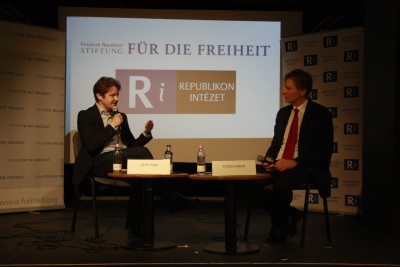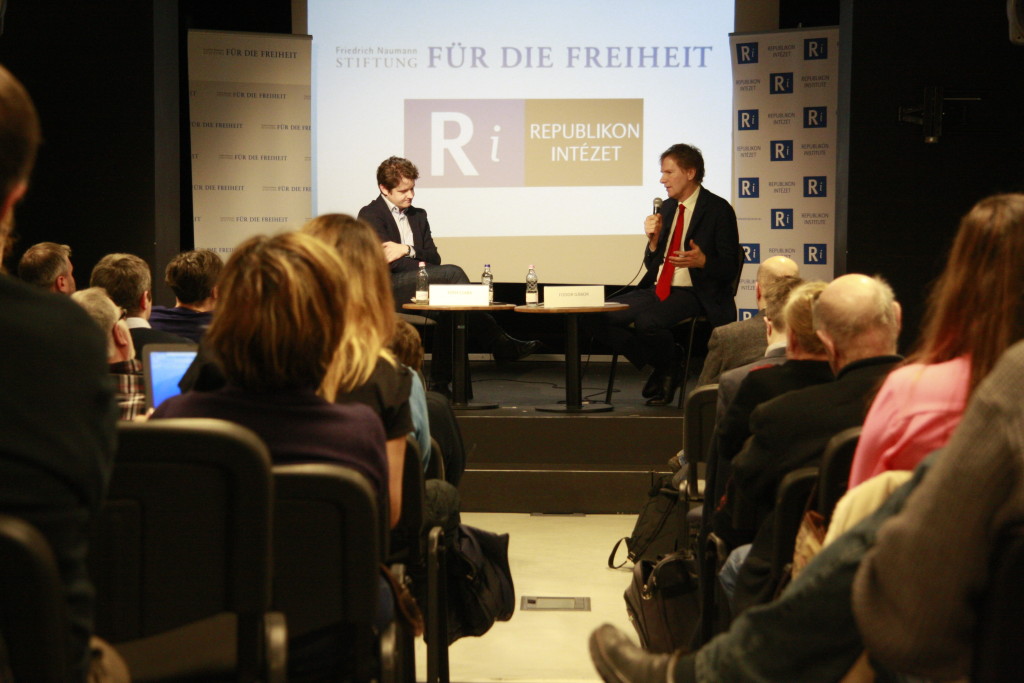The new conference series of the Republikon Institute and FNF called “Who should the liberal votes for?” continued on January 10, 2018, with a session with the participation of Gábor Fodor of the Hungarian Liberal Party (MLP). This initiative started back in November 2017, when Republikon organized a public discussion with Gergely Karácsony, the prime ministerial candidate of the Hungarian Socialist Party and the Dialogue. During these events each party has an opportunity to explain the presence and fulfillment of liberal viewpoints in their programmes. The main objective of the series is to assist Hungarian liberal voters in forming their party preferences before the 2018 Hungarian parliamentary election.
According to Gábor Fodor, it is obvious that liberals should vote for the only expressly liberal party, the MLP. While the liberal community is diverse, the aim of MLP is to address them. Currently, however, although there is no single liberal candidate, liberals should vote for the cooperation of the three parties led by Gergő Karácsony as a prime ministerial candidate. The main reason for this is the need to vote for liberal democracy against an illiberal regime.
Fodor emphasized that the election is still not settled. It is not by accident that the governing party of Viktor Orbán, Fidesz, is very active, since the majority of the voters want change. Whether Fidesz gains a two-third majority or they can be forced to make compromises is also of utmost importance.
 As Fodor explained, in 2014 it was not the cooperation of the opposition parties that constituted the problem during the last elections. The success was unattainable because the opposition organized itself too late and the politicians who were a part of it were not really strong supporters of the idea of such a cooperation to begin with. The voters saw these shortcomings. Such model of cooperation had also been forced by the one-turn election system introduced by Fidesz in 2012. However, the cooperation of opposition parties can also be justified by a similar ideological base, that is liberal democracy. This would also mean that such a cooperation cannot involve the extremist Jobbik party.
As Fodor explained, in 2014 it was not the cooperation of the opposition parties that constituted the problem during the last elections. The success was unattainable because the opposition organized itself too late and the politicians who were a part of it were not really strong supporters of the idea of such a cooperation to begin with. The voters saw these shortcomings. Such model of cooperation had also been forced by the one-turn election system introduced by Fidesz in 2012. However, the cooperation of opposition parties can also be justified by a similar ideological base, that is liberal democracy. This would also mean that such a cooperation cannot involve the extremist Jobbik party.
In terms of the referendum on the EU refugee relocation quota in 2016, Fodor defended the position taken at the time by the MLP party. The liberals were the only ones who campaigned for the relocation, while other opposition parties boycotted the referendum. Fodor noted that it was a brave and consistent standpoint. He also emphasized that MLP was the first party which called for local solutions during the refugee crisis. According to him, this became a mainstream opinion since then.
At the end of the event, responding to a question from the audience about the necessity of introducing liberal policies, Fodor explained that the smaller parties that are a part of the cooperation can better represent these issues. This cannot be done by the so-called catch-all parties, because for instance, MLP cannot overtly support euthanasia or the legalization of cannabis. In terms of economic issues, however, the differences between the respective opposition parties are greater. While MLP supports the flat tax, their partners are in favor of progressive taxation or even support the idea of the basic income. Nevertheless, despite these differences, it is the protection of liberal democracy that unites them and calls for an immediate and organized action.



